- Home
- Dan Abnett
Eisenhorn Omnibus Page 18
Eisenhorn Omnibus Read online
Page 18
and went. Settlers, mostly strong males, were recruited from the farm communities to work the mines, often brutally. The ecclesiarchs didn't seem to mind. As their populations drained, the farming settlements began to fail and die off. No help was given to sustain them. A disease, probably an off-world import, killed many. Then the volcanic activity began, suddenly, without warning. Everyone in the farmsteads was rounded up and pressed into service at the pits as if some great urgency was now driving the task. Rhizor and many like him toiled until they dropped, and later managed to escape, living like animals in the thorn forests.
So Dazzo and his mission had come to Damask, enslaved the population into a workforce, and were now hell-bent on mining out something from the territory around North Qualm. It seemed likely to me that the vulcanism had been triggered by incautious mining work.
I reached into his mind again… he trembled in fear as he felt the psychic touch… and showed him an image of Dazzo. Eagerly, he confirmed his identity. Then Locke, another face he knew and regarded with ill-concealed hatred. Locke had been chief among the men who had pressed the farmers into service. His cruelty had left a lasting mark. I showed him the faces of Urisel and Oberon Glaw, neither of which were known to him. At last, I visualised an image of the pipe-smoking man.
'Malahite/ he announced, recognising him at once. According to Rhizor, the obscura addict with the watery blue eyes was Girolamo Malahite, chief of the surveyors and engineers.
Fischig, who had joined us during the conversation, asked about the fibre-wood marker we had found at Gillan's Acre. Rhizor wrinkled his face with grief. That had marked the mass grave where the off-worlders had buried all those who had resisted.
Midas called me to the cockpit. 1 told Aemos to feed Rhizor and question him further.
Midas sat in the leather pilot's throne, his lap draped with spools of scroll paper stamped out of the electric press.
'No wonder Maxilla hid/ he said by way of an opening. 'Look here/
The scrolls were a transcription log of the astropathic and vox traffic Midas had been able to monitor from the ships in orbit. He slid a gloved finger down the jumbled columns of figures and text.
'I make out at least twelve vessels up there, maybe more. It's difficult to say an accurate figure. These here, for example, may be two ships in dialog or the same ship repeating itself/
'Coding?'
That's the interesting bit. It's all standard Imperial, the navy code called Textcept/
'That's common enough/
He nodded. And look here, the question and answer pattern indicates a capital ship checking that its fleet components have all arrived in real-space. It's a typical Imperial structure. Military… one of ours/
'A friendly fleet.'
'Not friendly, perhaps. Look at the command identifier here… that name translates as Estrum.'
The missing captain.'
The missing captain… perhaps not that missing after all. Perhaps… rogue. The whole incident at Gudrun anchorage, the mistaken recognition, the 'panic'… could have been an excuse to withdraw ships loyal to him.'
'But he's still broadcasting in standard Imperial code-form.'
'If his officers alone are party to the deceit, he won't want to alert the crews.'
An hour later, a large launch with fighter escort broke from the fleet and swung down to the surface of Damask. The transport set down at North Qualm, and the fighters circled the area twice before returning to their base ship. From the cutter, we could hear the booming roar of their thrusters rolling around the plateaux and valleys. Midas quickly switched the cutter's systems to minimum operation so they wouldn't make a chance detection of our instrumentation.
Aemos talked with Rhizor for most of the afternoon, and he seemed calmer and more willing to help once food had been given to him. As the light began to fail and evening approached, Aemos came to find me.
'If you want a way back in, that man might be able to help you.'
'Go on.'
'He knows the mines and the excavations. He worked there for a goodly while. I've spoken to him at length, and he seems certain he could show you to a cave network that links with the mining structure.'
We set out after dark in the speeder. Fischig drove, using the terrain scanner to see rather than the lamps. That made progress slower but more discreet. I sat next to him, and Bequin rode in the back with Rhizor. There had been some debate about which of us should go, but I had made the final selection. The speeder could hold four, and though Midas was the most able combatant in my group, more able than even the chastener in my view, I wanted him at the helm of the cutter, ready to respond. Besides, Bequin had uses of her own that I considered vital to our endeavour.
It took a long time to make the trek back to the North Qualm region, and we didn't arrive until well into the second half of the night. Clouds had masked the sky, hiding the moon and stars, and the only light was the flare of the volcanic hills, underlighting the low clouds with a fluctuating red haze. The air was thick with sulphurous smoke.
We left the speeder concealed in a hollow, its position flagged by a marker tag, and headed west around the outreaches of the area, the 'flame hills' as Rhizor called them.
Nocturnal creatures chattered and fluted in the darkness. Something larger and more distant howled. Pressing through the thorn-scrub, we
became aware of the harsh artificial lighting bathing the entire settlement. The volcanoes rumbled.
It took Rhizor a little time to find what he was looking for: a series of small, shallow pools, half-filled with geothermally heated water. The syrupy surfaces of the pools seethed and bubbled, and the site was plagued with insects drawn by the heat. Rhizor splashed cautiously into the largest pool, and worked his way around a massive boulder that was swathed in bright orange lichen. Behind it, masked by thorn and cycad, was a narrow cavity. This, he said, as best as I could understand him, was the route by which he had escaped from the slave-gangs.
We checked weapons and equipment and prepared to enter. I had opened the weapons locker on the cutter and provided us with as much efficient firepower as we could comfortably manage. I had my power-sword, an autopistol in a rig under my coat, and a las-carbine with a lamp pack taped under the muzzle. Other items of equipment filled the pack on my back. Bequin had kept her autopistol, and taken a flat-bladed knife, and she too had a lamp. I'd given Fischig an old but well-maintained heavy stubber, which seemed to please him enormously. He had his Arbites pistol, and a satchel full of spare ammo drums for the stubber. Rhizor had refused a weapon. I was certain he would leave us once we were safely en route anyway.
The cavity allowed us to enter single file. I led the way, with Rhizor behind me, then Bequin, and Fischig brought up the rear. It was damnably hot in the narrow rock passage, and the sulphurous gases forced us to wear our rebreathers. Rhizor had no breather, but tied a swathe of cloth around his nose and mouth. This was the practice the slaves had used when working the mines.
The passage wound back and forth, and climbed for a while as it coiled into the hill. In places, it was so steep we had to climb up the ragged floor of the burrow. Twice we had to remove our equipment packs to ease through constricted sections.
After an hour, I began to feel the oppressive throb of the psychic veil shrouding North Qualm. As we penetrated it, I listened out for the sound of alarms or activity, but none came. Though she didn't know it, Bequin was already doing her job by creating a dead spot that allowed us to press on invisibly. I made sure none of us strayed too far from her aura of influence.
The lava flues were crawling with lifeforms adjusted to existence in the hot, chemical-rich environment: blind, toad-like hunters, transparent beetles, albino molluscs and spiders that looked like they were fashioned from white gold. A fat, pallid centipede as long as my arm spurred its way over the baked rock at one junction.
Every few minutes the earth trembled. Loose rock and dust showered down from the roof, and warm, reeking gases blew bac
k along the winding rock halls.
The passage widened, and showed signs of excavation. Thorn-wood props supported the ceiling, and marker boards with numbers chalked on
them were nailed to every sixth post. Rhizor tried to explain where we were. He did his best, and I was able to ascertain we were in a section of mine that had been worked and then abandoned. He said other things too, but the meaning was beyond me. He led us to the end of one working, a low, propped tunnel, and I shone my light into a cavity that had been dug out of the loose shale and grit. Bequin knelt and brushed grit off the floor with her hand. She exposed old tiles, made of a dull, metallic substance I couldn't identify. The tiles were perfectly fitted, despite the fact that they were irregular octagons. They were strangely unsymmetrical, with some edges overlong. Yet they all fitted almost seamlessly. We could not begin to account for it, and the pattern they made was intensely uncomfortable.
At the rear of the cavity, ancient stonework had been exposed. I was no expert, but the stone, a hard pale material glittering with flecks of mica, didn't look local. There was evidence that parts of it had been cut away with rock drills and cutting beams.
This is old,' said Fischig. He ran his hand across the riven stone facing, 'but the damage is new.'
The wheel-graves,' Alizebeth Bequin said suddenly. I looked over at her. 'On Bonaventure/ she explained, remembering her homeworld. There were famous old sites in the western hills, made by races before man. They were arranged in radiating circles, like wheels. I used to go there, when I was a child. They had been decorated once, I suppose, but the surfaces had been cut away. Ransacked by later hands. It reminds me of this.'
There are many who make a trade in archaeological plunder/ said Fischig. 'And if it's xenos artefacts, the penalty is high.'
I'd overheard Glaw and his allies mention archeoxenon materials. If this was such a site, connected in some way to the as yet mysterious saruthi, it accounted for the way they persisted in working it despite the volcano.
What had they taken from here? What was it worth to them? What was it worth to the saruthi?
We retraced our steps back to the main seam, passing three more abandoned cavities. Each one had shown signs of the old stonework, and each had been robbed like the first.
We came to the end of the seam, and a metal ladder rose up through scaffolding to an opening in the rock ten metres up.
We climbed up into another tunnel, and at once heard the rattle of rock drills. The atmosphere was clearer here, and we were able to remove our rebreathers. Cold air, from the surface, I guessed, breezed down the tunnel. With extreme caution, we passed along, crossing the mouth of a gigantic cavern that had probably been a magmatic reservoir. The walls were polished and fused by heat. Crouching low, we looked in, and saw work gangs of men and women, undoubtedly Rhizor's kinfolk, forming basket chains to clear rock debris from the workface. There were at least a dozen of the bestial guards in their black, spiked armour. One walked the workline and administered encouragement with an electro-lash.
I peered in more intently, and tried to make sense of the main working. Two Damaskite slaves worked with rock drills, cutting back the crust of wall, exposing a wide stretch of the old stone facing. Other slaves, most of them women, laboured closely on the exposed section with small picks, awls and brashes, revealing carvings of intricate design.
A relay of shouts ran down the guard line, and we hid ourselves in the tunnel shadows. From up ahead, lamps bobbed and wove, and a party of men came down the tunnel from the surface into the cavern. Three were guards, two grey-shrouded supervisors with data-slates. The others were Gorgone Locke and the pipe-smoker Girolamo Malahite.
As I suspected, members of the Glaw cabal had escaped House Glaw alive. Estrum's rogue fleet had no doubt played a part in that salvation.
Locke was dressed in a leather robe with armoured panels woven into it. His mouth still showed the wound I had inflicted there. His mood was sullen.
Malahite was dressed in black as I had seen him before. He stood, studying data-slates, conferring with the dig supervisors and the leader of the guard team before moving to look at the exposed stretch of achaeoxenon material. The slave workers shrank back out of his way.
He exchanged a few words with the men around him, and the guard leader hurried off, returning with a bulky rocksaw. The tool trailed cables and tubes behind it, back to a socket junction at the mouth of the cavern, where it linked to a system of power and water supply lines running back up the tunnel to the generators and pumps at the surface.
The saw whined into life, pumping a sheen of water over its blade to keep it clean and cool. The guard leader carefully sliced the blade into the rock, the saw keening as it bit. In a few seconds, he had cut a slice of the carvings free. As far as I could tell, the carvings were made on individual stone blocks, and he was slicing the sculpted faces off the stones. He cut two more, and they were passed with reverence to Malahite, who studied them and then handed them on to be wrapped in plastic and placed in wooden carriers. The slices looked very much like the old stone tablets I had seen in that private study under House Glaw.
There was a loud crack. The guard leader had cut another tablet away, but it had broken into fragments. He dropped the saw and began to collect up the fragments frantically as those around him cursed and shouted. Locke moved in.
He kicked the man hard and dropped him to the ground, then kicked him repeatedly as he lay there, trying to shield his face, begging for mercy. Malahite gathered up the fragments.
You were told to be careful, you useless bastard!' Locke was growling.
'It can be repaired,' Malahite told the ship master. 'I can fuse it together.'
Locke wasn't listening. He kicked the man again, then dragged him up and threw him against the wall. He cursed at him some more and the man whimpered, pleading apologies.
Locke turned away from the battered wretch. Then he picked up the revving saw, swung back, and dismembered the guard leader.
It was inhuman. The agonised screams filled the chamber. All the slaves wailed and moaned, and even the guards looked away in distaste. Locke laid in with murderous glee, covering himself in blood.
Then he tossed the smoking saw onto the ground at his feet, and turned to another of the guards. He pointed to the saw.
'Make sure you do a better job,' he snarled.
With huge reluctance, the, guard picked up the saw and set to work.
Locke, Malahite and their party left after another ten minutes, followed by a work gang carrying the wooden crates full of cut tablets. We waited a few minutes, then followed them up the tunnel.
There was daylight ahead, scarce and thin. The tunnel came up into what I guessed was the large modular shed 1 had seen from my reconnaissance. Workers milled around on rest breaks, and guards and the grey-robed overseers wandered back and forth. Dig equipment and tools were piled up in the poorly lit shed. Fischig found a door at the back of the shed behind equipment boxes and broke the lock. The four of us were able to slip out of the shed from the rear into the settlement without having to pass through the main mine entrance and thus be seen.
We were now in a back lane of North Qualm, with the volcano slopes behind us. Rotting and abandoned buildings stood close all around, and flurries of ash and soot blew down over us. We kept close to the walls, holding back out of sight when anybody passed.
Behind the next jumble of ruins lay a cleared area partly masked by more flak-board screens, designed to keep the ash out. Two launches sat on the scorched ground: a large Imperial navy transport and a smaller, older shuttle. A thicker layer of ash coated the older shuttle's hull.
Figures moved around the entry ramps of both ships. Guards and workers were moving the wooden stretchers of excavated artefacts up into the belly hold of the navy launch. I could see Locke and Malahite standing nearby with several of the supervisors and three battlefleet officers in shipboard fatigues. One, a lean man with a receding chin and bulging eyes, wore the ribbons
and insignia of a captain. Our rogue, Estrum. As I watched, the ecclesiarch Dazzo emerged from a nearby building and crossed to them, holding the hem of his rich gown up out of the ash.
Shouting suddenly boomed across the yard. An angry human voice followed by a deeper, more savage sound that set the hairs on my neck up.
Lord Oberon Glaw, dressed in a cloak and body armour, slammed out of the building Dazzo had emerged from, striding across the landing yard. A second later, the huge, ghastly bulk of the Chaos Space Marine followed him, raging and cursing.
Glaw wheeled and faced the giant monster, resuming his argument at the top of his voice. For all his size, the lord of House Glaw was dwarfed by the vividly armoured blasphemy. The Traitor Marine had removed his helmet: his face was a white, powdered, lifeless mask of hate, with smears of gold dust and purple skin paint around the hollow eyes and a dry, lipless mouth
full of pearl-inlaid teeth. His only vaguely human face seemed to have been sutured onto his skull, the exposed parts of which were machined gold. There was a terrible stink of cloying perfume and organic corruption. I could not imagine the courage – or insanity – that it took to face down a Chaos Space Marine in a furious argument.
The wind was against us, and all we could hear was the violent snarl of the voices instead of actual words. Dazzo and Malahite quickly crossed to Glaw's side, and most of the other guards and workers present cowered back.
The wind changed a little.
'.. .will not deny me any longer, you human filth!' The awful voice of the Traitor Marine could suddenly be heard.
'You will show me respect, Mandragore! Respect!' Glaw yelled back, his voice powerful but seemingly frail against the roar of the Chaos warrior.
The Marine bellowed something else that ended in '…slay you all and finish this work myself! My masters await, and they await the perfect completion of this task! They will not idle their time while you vermin dawdle and slacken!'
'You will abide by our pact! You will keep to our agreement!'

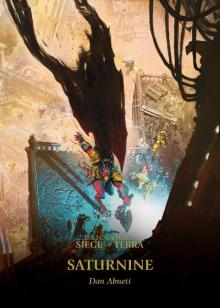 Saturnine
Saturnine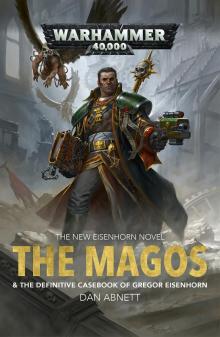 The Magos
The Magos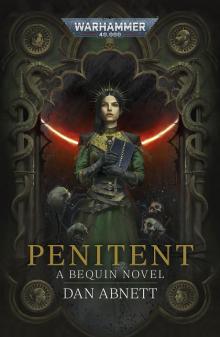 Penitent
Penitent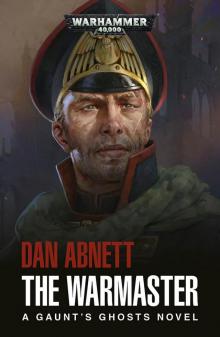 THE WARMASTER
THE WARMASTER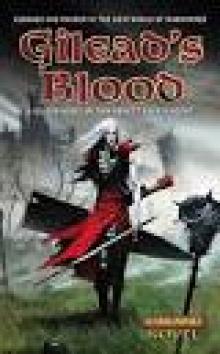 Gilead's Blood
Gilead's Blood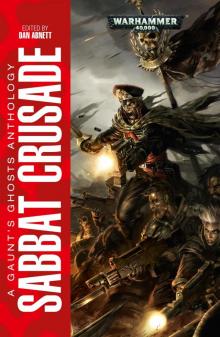 Sabbat Crusade
Sabbat Crusade![[Warhammer 40K] - Double Eagle Read online](http://i1.bookreadfree.com/i/03/16/[warhammer_40k]_-_double_eagle_preview.jpg) [Warhammer 40K] - Double Eagle
[Warhammer 40K] - Double Eagle![[Gaunt's Ghosts 02] - Ghostmaker Read online](http://i1.bookreadfree.com/i/03/16/[gaunts_ghosts_02]_-_ghostmaker_preview.jpg) [Gaunt's Ghosts 02] - Ghostmaker
[Gaunt's Ghosts 02] - Ghostmaker![[Gaunt's Ghosts 10] - The Armour of Contempt Read online](http://i1.bookreadfree.com/i/03/16/[gaunts_ghosts_10]_-_the_armour_of_contempt_preview.jpg) [Gaunt's Ghosts 10] - The Armour of Contempt
[Gaunt's Ghosts 10] - The Armour of Contempt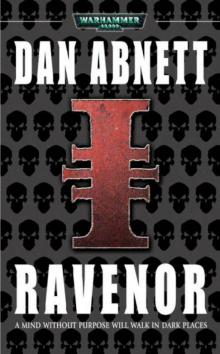 Ravenor
Ravenor Border Princes
Border Princes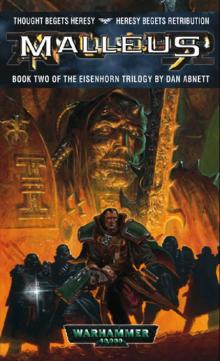 Warhammer - Eisenhorn 02 - Malleus (Abnett, Dan)
Warhammer - Eisenhorn 02 - Malleus (Abnett, Dan)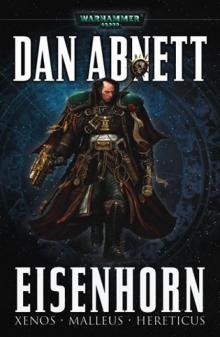 Eisenhorn Omnibus
Eisenhorn Omnibus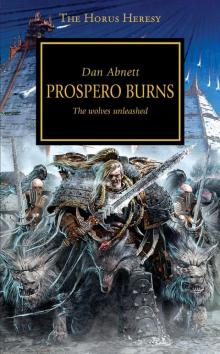 Prospero Burns
Prospero Burns The Story of Martha
The Story of Martha Extinction Event
Extinction Event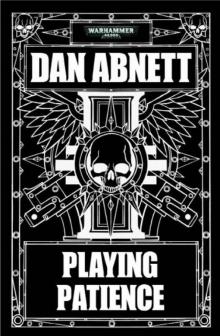 Playing Patience
Playing Patience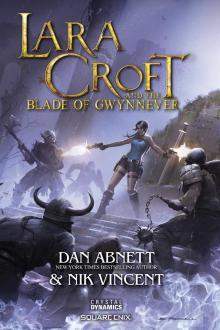 Lara Croft and the Blade of Gwynnever
Lara Croft and the Blade of Gwynnever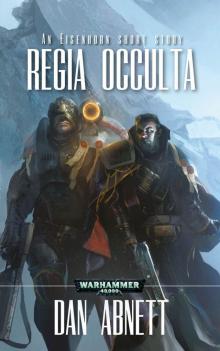 Regia Occulta
Regia Occulta![[Gaunt's Ghosts] - The Iron Star Read online](http://i1.bookreadfree.com/i/03/13/[gaunts_ghosts]_-_the_iron_star_preview.jpg) [Gaunt's Ghosts] - The Iron Star
[Gaunt's Ghosts] - The Iron Star![[Warhammer] - Fell Cargo Read online](http://i1.bookreadfree.com/i/03/13/[warhammer]_-_fell_cargo_preview.jpg) [Warhammer] - Fell Cargo
[Warhammer] - Fell Cargo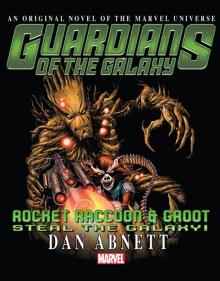 GUARDIANS OF THE GALAXY: ROCKET RACCOON & GROOT STEAL THE GALAXY!
GUARDIANS OF THE GALAXY: ROCKET RACCOON & GROOT STEAL THE GALAXY!![[Ravenor 01] Ravenor - Dan Abnett Read online](http://i1.bookreadfree.com/i/03/20/[ravenor_01]_ravenor_-_dan_abnett_preview.jpg) [Ravenor 01] Ravenor - Dan Abnett
[Ravenor 01] Ravenor - Dan Abnett![[Gaunt's Ghosts 06] - Straight Silver Read online](http://i1.bookreadfree.com/i/03/17/[gaunts_ghosts_06]_-_straight_silver_preview.jpg) [Gaunt's Ghosts 06] - Straight Silver
[Gaunt's Ghosts 06] - Straight Silver![[Ravenor 02] Ravenor Returned - Dan Abnett Read online](http://i1.bookreadfree.com/i/03/20/[ravenor_02]_ravenor_returned_-_dan_abnett_preview.jpg) [Ravenor 02] Ravenor Returned - Dan Abnett
[Ravenor 02] Ravenor Returned - Dan Abnett![[Gaunt's Ghosts 08] - Traitor General Read online](http://i1.bookreadfree.com/i/03/14/[gaunts_ghosts_08]_-_traitor_general_preview.jpg) [Gaunt's Ghosts 08] - Traitor General
[Gaunt's Ghosts 08] - Traitor General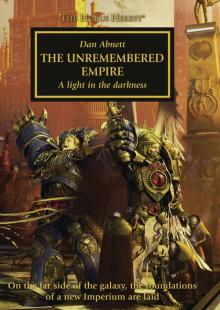 The Unremembered Empire
The Unremembered Empire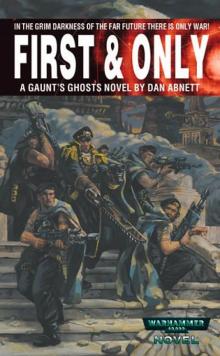 First and Only
First and Only![[Darkblade 05] - Lord of Ruin Read online](http://i1.bookreadfree.com/i/03/15/[darkblade_05]_-_lord_of_ruin_preview.jpg) [Darkblade 05] - Lord of Ruin
[Darkblade 05] - Lord of Ruin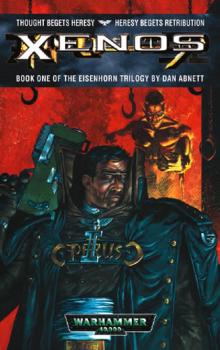 Warhammer - Eisenhorn 01 - Xenos (Abnett, Dan)
Warhammer - Eisenhorn 01 - Xenos (Abnett, Dan) Meduson
Meduson The Fall of Malvolion
The Fall of Malvolion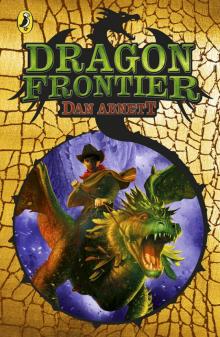 Dragon Frontier
Dragon Frontier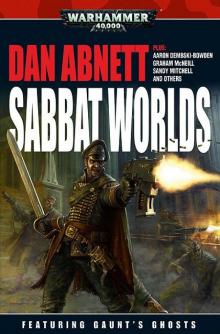 Sabbat Worlds
Sabbat Worlds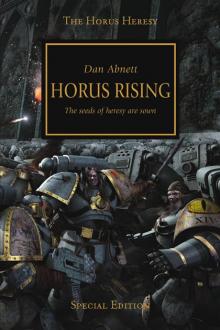 Horus Rising
Horus Rising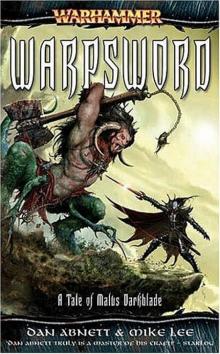 Warhammer - Darkblade 04 - Warpsword
Warhammer - Darkblade 04 - Warpsword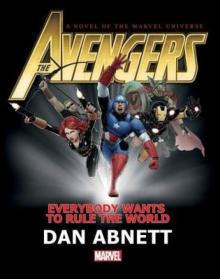 Avengers_Everybody Wants to Rule the World_Marvel Comics Prose
Avengers_Everybody Wants to Rule the World_Marvel Comics Prose![[Gaunt's Ghosts 04] - Honour Guard Read online](http://i1.bookreadfree.com/i/03/16/[gaunts_ghosts_04]_-_honour_guard_preview.jpg) [Gaunt's Ghosts 04] - Honour Guard
[Gaunt's Ghosts 04] - Honour Guard![[Darkblade 04] - Warpsword Read online](http://i1.bookreadfree.com/i/03/16/[darkblade_04]_-_warpsword_preview.jpg) [Darkblade 04] - Warpsword
[Darkblade 04] - Warpsword![[Gaunt's Ghosts 11] - Only in Death Read online](http://i1.bookreadfree.com/i/03/16/[gaunts_ghosts_11]_-_only_in_death_preview.jpg) [Gaunt's Ghosts 11] - Only in Death
[Gaunt's Ghosts 11] - Only in Death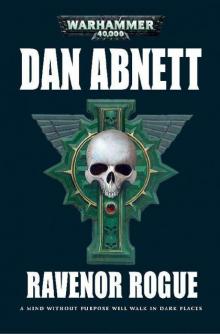 Ravenor Rogue
Ravenor Rogue![[Ravenor 03] Ravenor Rogue - Dan Abnett Read online](http://i1.bookreadfree.com/i/03/16/[ravenor_03]_ravenor_rogue_-_dan_abnett_preview.jpg) [Ravenor 03] Ravenor Rogue - Dan Abnett
[Ravenor 03] Ravenor Rogue - Dan Abnett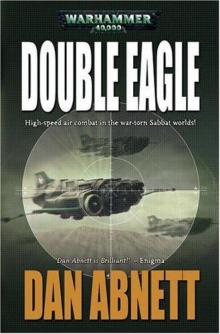 Double Eagle
Double Eagle Doctor Who - The Silent Stars Go By
Doctor Who - The Silent Stars Go By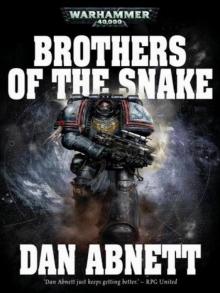 Brothers of the Snake
Brothers of the Snake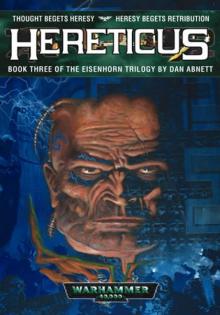 Warhammer - Eisenhorn 03 - Hereticus (Abnett, Dan)
Warhammer - Eisenhorn 03 - Hereticus (Abnett, Dan)![[Darkblade 03] - Reaper of Souls Read online](http://i1.bookreadfree.com/i/03/16/[darkblade_03]_-_reaper_of_souls_preview.jpg) [Darkblade 03] - Reaper of Souls
[Darkblade 03] - Reaper of Souls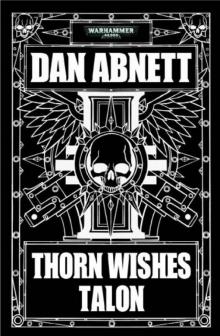 Thorn Wishes Talon
Thorn Wishes Talon Doctor Who
Doctor Who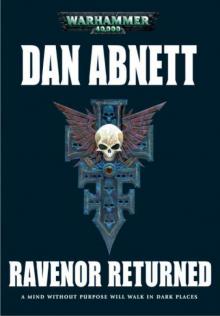 Ravenor Returned
Ravenor Returned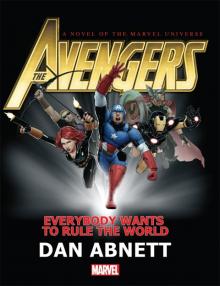 Avengers: Everybody Wants to Rule the World
Avengers: Everybody Wants to Rule the World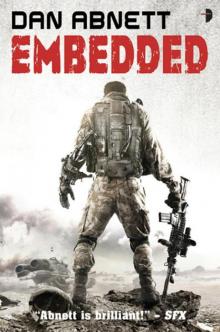 Embedded
Embedded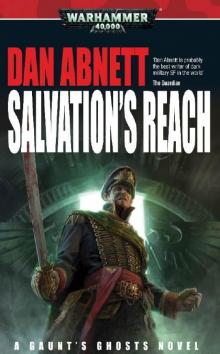 Salvation's Reach
Salvation's Reach![[Gaunt's Ghosts 03] - Necropolis Read online](http://i1.bookreadfree.com/i/03/19/[gaunts_ghosts_03]_-_necropolis_preview.jpg) [Gaunt's Ghosts 03] - Necropolis
[Gaunt's Ghosts 03] - Necropolis![[Darkblade 01] - The Daemon's Curse Read online](http://i1.bookreadfree.com/i/03/17/[darkblade_01]_-_the_daemons_curse_preview.jpg) [Darkblade 01] - The Daemon's Curse
[Darkblade 01] - The Daemon's Curse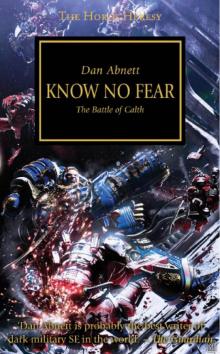 Know No Fear
Know No Fear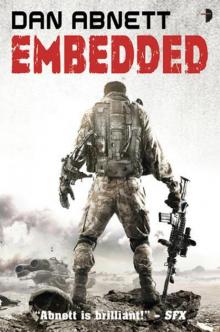 Dan Abnett - Embedded
Dan Abnett - Embedded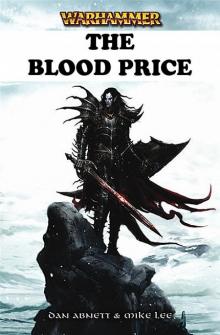 00.1 - The Blood Price
00.1 - The Blood Price![[Warhammer 40K] - Sabbat Worlds Read online](http://i1.bookreadfree.com/i/03/17/[warhammer_40k]_-_sabbat_worlds_preview.jpg) [Warhammer 40K] - Sabbat Worlds
[Warhammer 40K] - Sabbat Worlds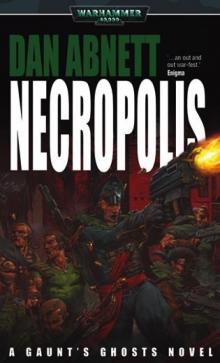 Necropolis
Necropolis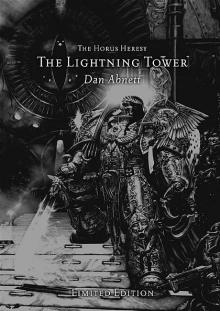 The Lightning Tower & The Dark King
The Lightning Tower & The Dark King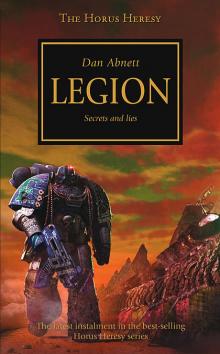 Legion
Legion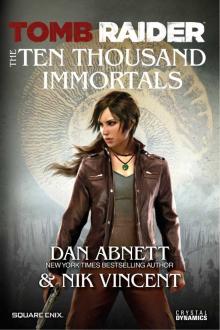 Tomb Raider: The Ten Thousand Immortals
Tomb Raider: The Ten Thousand Immortals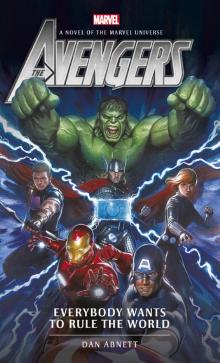 Avengers
Avengers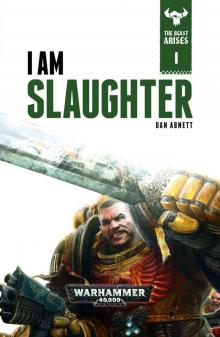 I am Slaughter
I am Slaughter![[Gaunt's Ghosts 07] - Sabbat Martyr Read online](http://i1.bookreadfree.com/i1/04/02/[gaunts_ghosts_07]_-_sabbat_martyr_preview.jpg) [Gaunt's Ghosts 07] - Sabbat Martyr
[Gaunt's Ghosts 07] - Sabbat Martyr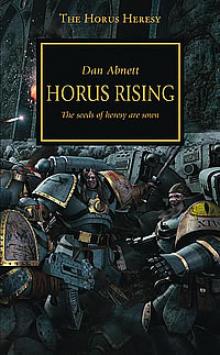 The Horus Heresy: Horus Rising
The Horus Heresy: Horus Rising![[Gaunt's Ghosts 01] - First & Only Read online](http://i1.bookreadfree.com/i1/04/02/[gaunts_ghosts_01]_-_first_&_only_preview.jpg) [Gaunt's Ghosts 01] - First & Only
[Gaunt's Ghosts 01] - First & Only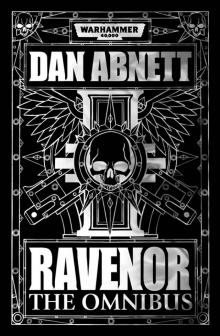 Ravenor Omnibus
Ravenor Omnibus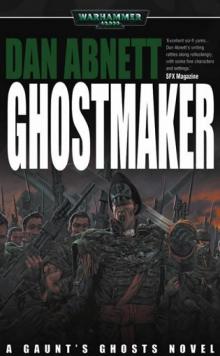 Ghostmaker
Ghostmaker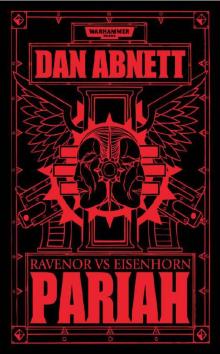 Pariah: Eisenhorn vs Ravenor
Pariah: Eisenhorn vs Ravenor![[Gaunt's Ghosts 12] - Blood Pact Read online](http://i1.bookreadfree.com/i1/04/04/[gaunts_ghosts_12]_-_blood_pact_preview.jpg) [Gaunt's Ghosts 12] - Blood Pact
[Gaunt's Ghosts 12] - Blood Pact![[Gaunt's Ghosts 05] - The Guns of Tanith Read online](http://i1.bookreadfree.com/i1/04/01/[gaunts_ghosts_05]_-_the_guns_of_tanith_preview.jpg) [Gaunt's Ghosts 05] - The Guns of Tanith
[Gaunt's Ghosts 05] - The Guns of Tanith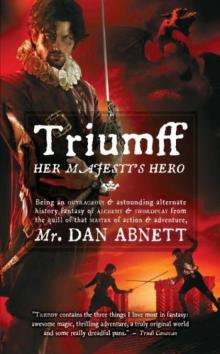 Triumff: Her Majesty's Hero
Triumff: Her Majesty's Hero![[Gaunt's Ghosts 09] - His Last Command Read online](http://i1.bookreadfree.com/i1/04/02/[gaunts_ghosts_09]_-_his_last_command_preview.jpg) [Gaunt's Ghosts 09] - His Last Command
[Gaunt's Ghosts 09] - His Last Command![[Darkblade 00.1] - The Blood Price Read online](http://i1.bookreadfree.com/i2/04/03/[darkblade_00_1]_-_the_blood_price_preview.jpg) [Darkblade 00.1] - The Blood Price
[Darkblade 00.1] - The Blood Price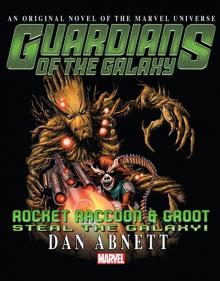 Guardians of the Galaxy: Rocket Raccoon and Groot - Steal the Galaxy!
Guardians of the Galaxy: Rocket Raccoon and Groot - Steal the Galaxy!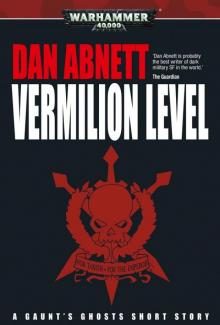 Vermilion Level
Vermilion Level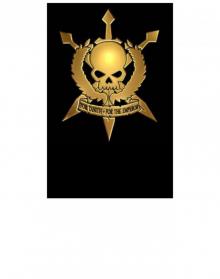 In Remembrance
In Remembrance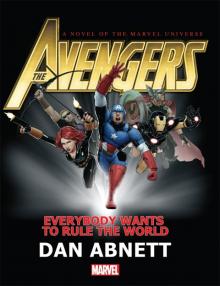 The Avengers: Everybody Wants to Rule the World
The Avengers: Everybody Wants to Rule the World Border Princes t-2
Border Princes t-2![[Darkblade 02] - Bloodstorm Read online](http://i1.bookreadfree.com/i2/04/07/darkblade_02_-_bloodstorm_preview.jpg) [Darkblade 02] - Bloodstorm
[Darkblade 02] - Bloodstorm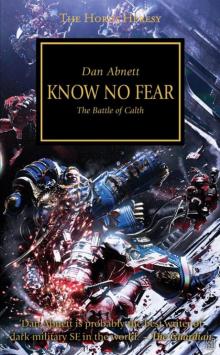 Know no fear. The Battle of Calth hh-19
Know no fear. The Battle of Calth hh-19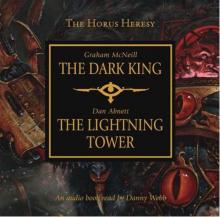 The Dark King and The Lightning Tower
The Dark King and The Lightning Tower